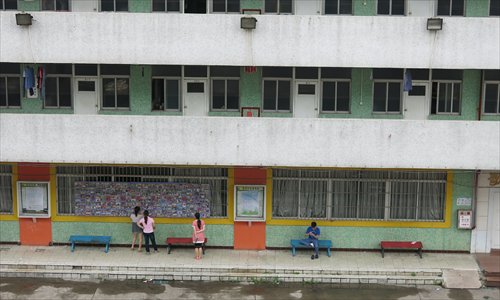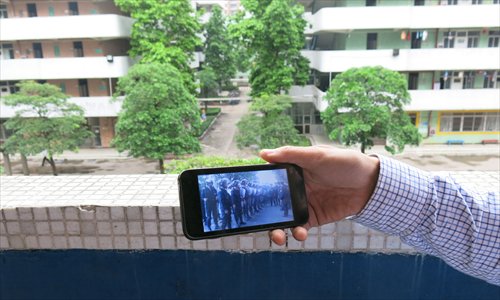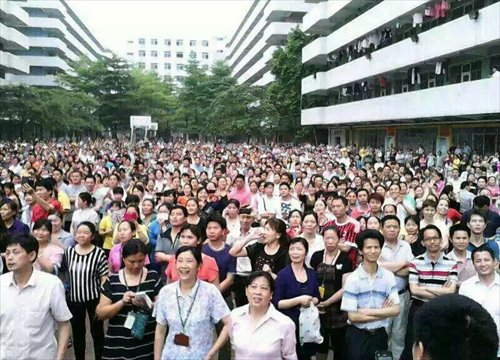Taking whose side?

Workers on strike in a Yue Yuen factory idle away the day in their dormitory compound in Gaobu township, Dongguan, Guangdong Province, on April 23. Photo: Li Qian/GT
He, a factory worker, finally got back to her production line on Monday after nearly two weeks participating in the biggest strike in modern China. But it was not really her decision to go back to work.
The factory, which was being criticized for not making required payments into pension accounts over a long period, had pledged to resolve the problem to a limited extent. However, employees say they are still owed millions of yuan.
This labor movement stalled the operations of Yue Yuen Industrial Holdings Ltd, the world's biggest shoemaker, which assembles shoes for major sportswear brands. The strike made international headlines for its sheer scale as well as the common problems in Chinese factories it revealed.
But now, the involvement of the local Dongguan government is being blasted by many workers as the major factor that foiled their efforts to claim their legal benefits.
Yue Yuen announced more than 80 percent of workers had returned to work on April 25, and different labor organizations confirmed that most of the workers in the 10 factories involved had resumed work by Tuesday.
Big company, big mistake
Besides its infamous underground sex industry, Dongguan is famous for the bustling factories that are scattered throughout the area. Even in an industrial city like Dongguan, the Taiwanese-invested Yue Yuen group is prominent and its factory and dormitory buildings dominate the skyline of Gaobu township in the city and accommodate more than 45,000 workers.
It all began in March when a retired Yue Yuen worker discovered that even though he had already paid his due endowment insurance scheme for more than 15 years, the minimum length for a worker to enjoy a pension after retirement, he couldn't get his pension. He could only receive 680 yuan ($108) per month, the minimum living standard for the retired as required by the city government. He should have been receiving a pension of 1,810 yuan per month.
According to China's Labor Law, a worker has to deposit 8 percent of his or her salary to a designated pension account every month, while the employer pays another amount equaling 11 percent of the salary to the same account. When a worker has paid that amount for 15 years he is eligible to receive a pension.
It turned out that Yue Yuen did not pay its due 11 percent for most of the workers. In addition, it did not put the full of 8 percent of the workers' salaries, the part a worker should pay, to each worker's social welfare account. By avoiding this payment, the workers' salaries seemed inflated as they received a bit more cash on hand in wages.
Following that worker's discovery, a wave of workers checked their social welfare balance, only to discover the same problem.
Many of them had been working for Yue Yuen for more than 10 years, and the longest serving term was 19 years among the workers contacted by the Global Times. That means the company owed each of them tens of thousands of yuan in unpaid endowment insurance.
Unfortunately, labor experts say this problem is not unusual among China's industrial enterprises. Business owners are often reluctant to pay the mandatory endowment for the workers, which is crucial for their pensions.

A Yue Yuen factory worker displays pictures of armed police that he took during the mass protest by Yue Yuen workers. Photo: Li Qian/GT
Back down amid strike
According to China's Labor Law, the company should have started paying workers' endowment insurance and housing funds in 1998.
By avoiding its duty, Yue Yuen has evaded paying hundreds of millions of yuan over the years.
The strike halted production, though Yue Yuen factories in other regions were largely unaffected. The company was faced with increasing pressure to meet the orders as some clients, such as adidas, announced they would shift parts of their orders to other manufacturers.
On April 21, a week after the strike, Yue Yuen offered a solution to the workers. It said the company would start paying all due contributions according to the law from May 1, and promised to "subsidize" every worker with 230 yuan per month. However, it was blasted by the workers as being arrogant and insufficient in terms of addressing the previously unpaid amounts.
As the strike continued, Yue Yuen further backed down and promised on Monday that it would make up for all the unpaid payments to workers' endowment insurance funds.
This represents a degree of success for the workers' campaign, said Zhang Zhiru, director of Shenzhen Chunfeng Labor Disputes Services Center, an NGO, as it will make the workers eligible to receive pensions.
However, in order to be eligible to receive pensions, workers will still have to pay their own part of the endowment insurance, which has only been partially paid. Many workers are reluctant to pay such an amount themselves, usually in thousands or more, as they believe Yue Yuen should pay it for them because it cheated the employees.
Some don't have faith in the pension deposit mechanism at all and would rather receive their payment all in cash.
A security guard, surnamed Liu, who has been working in Yue Yuen for 11 years, said it's hard for him to decide whether to accept the deal.
"I don't have spare money. All my money is sent back home to support the family," he said. Liu's wife and son stayed in their hometown in Hunan Province, entirely dependent on his earnings.

A photo taken by an anonymous Yue Yuen worker shows workers gathering outside their dormitory on the first day of their strike, on April 14.
Local governments intervene
Yue Yuen is not the only organization taking note. The local government has been closely watching the situation.
A spokesperson for China's Ministry of Human Resources and Social Security admitted last Friday that there had been misconduct by Yue Yuen, and said the Dongguan Social Security Department had ordered the company to rectify it.
On April 5, before the formal strike, thousands of workers protested in their factory compound and on the streets. Police dispersed the protesters using force and detained multiple people. Dongguan authorities said no one was injured in the process, but workers showed the Global Times pictures they took to prove that police struck them with batons. At least one worker was seriously injured and is still in hospital. Other workers have donated money for his treatment, they say.
Police have stayed on alert during the strike, and police officers and vehicles were visible outside the factory entrance and on major streets in the town.
Aside from clearing people from streets, the Dongguan government also attempted every means to get workers back to work and restore order.
However, rights activists say the Dongguan authorities' efforts have been focused on the wrong target. Two members of the Shenzhen Chunfeng Labor Disputes Services Center were apprehended, including its director Zhang Zhiru, who has been closely monitoring and supporting the workers on strike.
Zhang was taken from his Shenzhen office to a Guangzhou suburb and was confined for 61 hours. His assistant Lin Dong was taken away at the same time as Zhang's detention - noon of April 22 - but to a different location. Zhang was informed by Dongguan police on Monday that Lin has officially been detained for "provocation."
After Zhang's release, all instant messenger groups he used to contact the Yue Yuen workers disappeared.
He, the factory worker, said she was surprised a working group of officials from her hometown of Changde, Hunan Province, came to Yue Yuen to urge them stop resisting the company. Among the 45,000 workers, more than 7,000 were from Changde.
In the factories, Dongguan police urged them to work on the production line.
"We didn't know what else to do. No one told us," said He. Activist Zhang Zhiru said the workers don't have a real labor organization, and they went on strike almost voluntarily.
Tip of the iceberg
Factories in Dongguan as well as other parts of China are facing a harsh time. Last year, Yue Yuen closed one of its factories in Yangzhou, Jiangsu Province.
The glory days for Dongguan factories have gone, partly because of the rising cost of labor in China. The government-sanctioned minimum wage in Dongguan tripled from 430 yuan in 2001 to 1,310 yuan in 2013, which increasingly became a burden for enterprises.
Even though salaries rose steadily, it has been increasingly difficult for factories to recruit staff. One of the Yue Yuen workers, named Zhu Junli, said that when he entered Yue Yuen in 2002, job applicants had to bribe the managers in order to enter the factory. But now, it's a headache for managers to find enough staff.
It's a problem all over Dongguan. On the streets of Gaobu township, recruitment posters can be seen everywhere.
There will be more mass protests like this, said Zhang, as the second- and third-generations of migrant workers are better educated and more demanding when it comes to securing their rights compared with their predecessors 30 years ago.
Wang Jiangsong, a professor with the China Institute of Industrial Relations, predicted an onslaught of labor disputes as a result of the accumulating problems in China, the world's factory.
"Now it's time to correct the low rights, low cost attitude toward economic development, otherwise the problems will snowball," he told the Global Times.
To bring the manufacturing industry to the right track, factories which focus on low cost and simple labor should be phased out, Wang said, and this coincides with a recent tendency in which more foreign invested enterprises are relocating from China to Southeastern countries.
The central government has also emphasized this change and has called to restructure and upgrade China's economy, Wang said.
Newspaper headline: Govt walks a fine line between labor rights and investment amid strikes